06 May BLOG: Mental Health Awareness Week – Loneliness
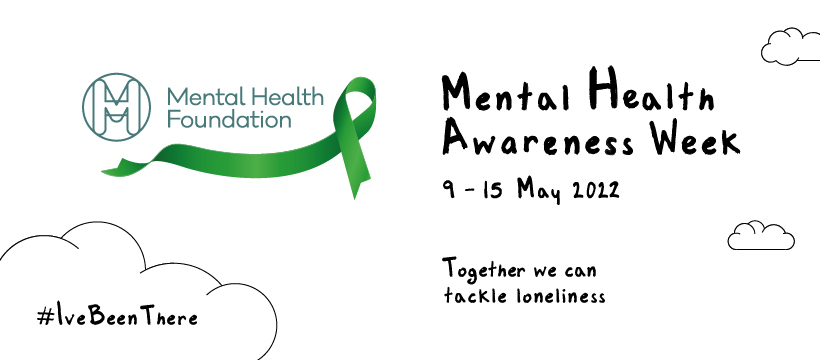
The 9th-15th May is Mental Health Awareness Week for 2022, a time for increased conversations about mental health and what we can do to improve the wellbeing of ourselves and those around us. This year’s theme is ‘Loneliness’.
According to the Office for National Statistics, in total, 45% of adults feel occasionally, sometimes or often lonely in England. This equates to over 25 million people.[1]
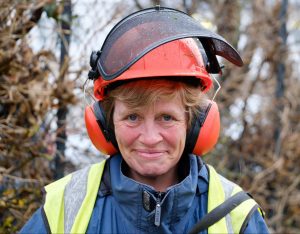 Over the past year, the Covid-19 pandemic has continued to highlight how crucial it is to feel connected with others. Research shows that during the lockdowns, loneliness was almost 3 times that of pre-pandemic levels.[2] The proportion of people who were chronically lonely also increased from 5% (2.6 million adults) in April 2020 to 7.2% (3.7 million adults) in February 2021.[3] The absence of connection; not seeing friends, family, work colleagues and therapists on a regular basis left people feeling incredibly isolated, and even with the lifting of restrictions, loneliness remains a huge public health concern, particularly for those struggling with mental ill-health.
Over the past year, the Covid-19 pandemic has continued to highlight how crucial it is to feel connected with others. Research shows that during the lockdowns, loneliness was almost 3 times that of pre-pandemic levels.[2] The proportion of people who were chronically lonely also increased from 5% (2.6 million adults) in April 2020 to 7.2% (3.7 million adults) in February 2021.[3] The absence of connection; not seeing friends, family, work colleagues and therapists on a regular basis left people feeling incredibly isolated, and even with the lifting of restrictions, loneliness remains a huge public health concern, particularly for those struggling with mental ill-health.
So, this #MHAW we thought we would share some personal stories, experiences and advice on loneliness from the Oakleaf team, with the aim of instilling the message that everyone deals with loneliness at some point in their lives; and that we are all in this together.
“For me, work is a large part of being sociable and being part of a community. During the first Covid lockdown, I worked from home and really missed the social element of being in the office. I set up a regular online meeting with my office colleagues, so that we could all keep in touch and have a chat, without it having to be about work. We could share what we’ve been up to at the weekend, let off steam about work hassles, show each other photos of our family, or allotment(!), just like we would if we were all sat together in the office.”
“On a more personal level, my hobbies (mostly craft related) tend to be quite solitary. I don’t have any local ‘sewing buddies’. So, I use Instagram to connect with other crafty people. The online community is very good at creating opportunities to meet up in person and it’s been great to meet all my new virtual friends.
In May I’ll be participating in a long-standing internet challenge, ‘Me-Made May,’ where you’re encouraged to wear the clothing you make for yourself. Because a lot of people choose to share their daily progress on Instagram, it’s a great way for me to find new people to follow and connect with, as well as cheering on my online sewing friends with their own challenges.”
Now that many organisations have moved to permanent remote working following the pandemic, human connection has never been more important. Working from home can increase feelings of loneliness and isolation, so having some form of human contact throughout the week can make the world of difference to your mental health, whether this be through hobbies, hanging out with friends and family, setting up Zoom meetings, going for a walk in your local park, or simply having a catch up with someone over the phone.
Another good way to form connections is by introducing small gestures and random acts of kindness into you work and social life. Helping others to feel less alone can be very rewarding. Little things like making someone a coffee, smiling at passers-by on the street, or just remembering to say “hello” in the morning will show your friends, family and colleagues that you care, and that their wellbeing matters to you.
“The loneliest time of my life was when I was 18. My dad died after a very long and desperate illness. I was not alone – there were many people around me, living their happy, teenage lives. But no one I knew had experienced loss and grief at this formative age and that loneliness of experience was a huge and isolating challenge for me.
Over 35 years on, it makes me appreciate that loneliness is not only about lack of loved ones but can often be about not being able to connect with others, even in a crowded place.”
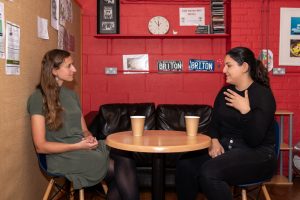 The term ‘loneliness’ can be described as “a subjective, unwelcome feeling of lack or loss of companionship, which happens when there is a mismatch between the quantity and quality of the social relationships that we have, and those that we want.” This means it can be different for all of us.[4]
The term ‘loneliness’ can be described as “a subjective, unwelcome feeling of lack or loss of companionship, which happens when there is a mismatch between the quantity and quality of the social relationships that we have, and those that we want.” This means it can be different for all of us.[4]
Always make sure to be honest with yourself about how you are feeling. If you are feeling isolated or alone, help others to understand what you’re going through and lean on them for support. Create space for these conversations. They can offer different perspectives from whatever is going on inside your own head and keep you grounded.
You can also point neighbours, friends and loved ones to counselling services and online communities like Togetherall and Ginger, which can provide peer-to-peer support and a safe space to talk about your feelings, without judgement.
“I felt lonely and a little lost when I started maternity leave. I tried volunteering at a start-up charity and offered to help them when I could. I even tried my hand at photography and a beginner’s tennis course. I still don’t think I’m great, but I enjoy spending time with others. It gave me a sense of purpose and I made friends with people I otherwise wouldn’t have met.”
At Oakleaf, we offer clients a wide range of wellbeing activities and support groups designed to build confidence, physical health and wellbeing whilst reducing isolation and loneliness. Our activities range from: Photography, Confidence Building, Badminton, Choir, Tai Chi, Art workshops, our Youth Group, Football, Mindful Colouring, Fitness, our Wildlife Group, our Mental Health Support Group and many more. Click here to view our Client Calendar for the month of May.
We are proud to say, that having started with just 40 clients, we were able to support 877 individuals in 2021.
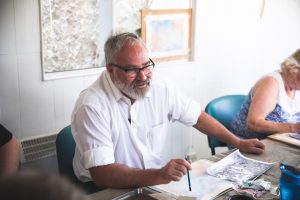
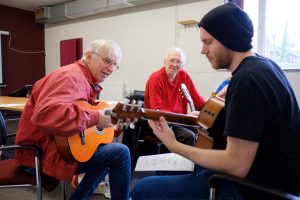
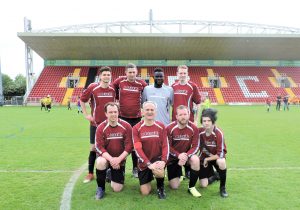
“I had only just started with Oakleaf when the lockdown commenced, so as you can imagine it left me stranded and very isolated. I am doing a range of different courses through Oakleaf and I am thankful for all their time, kindness, help and support. Every class and member of staff has shown so much commitment to help and understand every one of us, including myself. These classes have given me a reason to get out of bed and have provided me with a real drive and daily structure.” – John, Oakleaf client
Volunteering is another great way to connect with other people and in turn, give back to the community. There are many ways in which you can use your time and skills to volunteer at Oakleaf:
- Wellbeing Activities
- Work-Related Training
- Fundraising Events
- On reception or in our coffee shop
- CV writing and job searches
The list is endless! Click here to learn more about all the volunteering opportunities at Oakleaf.
“Volunteering in a field you enjoy on a weekly basis gets you out and about and helps forge friendships with like-minded people who have common interests.”

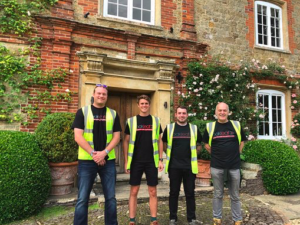
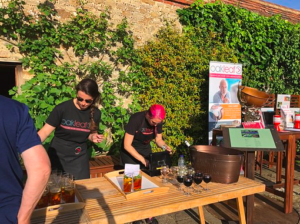
Support from our amazing volunteers ensures we can continue to provide mental health, employment and wellbeing support to hundreds of individuals across Surrey – it really does make all the difference and we couldn’t do it without you.
“I really enjoyed getting involved with my son’s primary school when they were younger. I volunteered in the classroom, went on school trips and helped organise PTA events. It really made me feel part of the ‘school community’ and involved in the local area. If you have a busy work life and aren’t there in the playground at pick up/drop off, you can feel a bit disconnected from the school and other parents. Volunteering really makes you feel involved.”
“I joined our local walking group through my GP when I finally returned from hospital and needed to get out and meet people. Very gentle walks and a great way to chat and meet people in your area.”
You could also volunteer as a call companion with charities like Re-Engage, to help provide that lifeline of friendship to those without a support network or those who are unable to easily talk about their feelings. Similarly, the Royal Voluntary Service has formed a Virtual Village Hall, which offers volunteers a wide range of activities to take part in online.
In addition, Volunteer’s Week 2022 will be running from 1st to 7th June during the #MonthofCommunity, which brings together organisations with a range of events in order to encourage us all to think about and join in with activities in our local communities.
There are plenty of things you can do throughout the week – and for weeks to come – to combat loneliness and help reduce the stigma surrounding it. To find out more about Mental Health Awareness Week 2022 and the ways in which you can get involved, click here.
We hope that this small insight into our team’s thoughts and feelings about loneliness will remind you that #YouAreNotAlone and #HelpIsAlwaysAvailable.
If you or someone you know is struggling or simply just need someone to talk to, please make use of the resources below:
Mind: How to Find a Therapist
Samaritans: 116 123 (24 hours)
Citizens Advice: 03444 111 444 (Mon-Fri, 9am-5pm)
Guildford Safe Haven: 6-11pm, 365 days a year
Young Adult Safe Haven: 5-9pm, 365 days a year
[1] ONS (2019) Population estimates for the UK, England and Wales, Scotland and Northern Ireland: mid-2019 https://www.ons.gov.uk/peoplepopulationandcommunity/populationandmigration/populationestimates/bulletins/annualmidyearpopulationestimates/mid2019estimates#population-growth-in-england-wales-scotland-and-northern-ireland
[2] Mental Health (2020) https://www.mentalhealth.org.uk/our-work/research/coronavirus-mental-health-pandemic/
[3] ONS (2021) Mapping loneliness during the coronavirus pandemic https://www.ons.gov.uk/ peoplepopulationandcommunity/wellbeing/articles/ mappinglonelinessduringthecoronavirus pandemic/2021-04-07
[4] Perlman and Peplau (1981) Cognitive Discrepancy Theory




Sorry, the comment form is closed at this time.